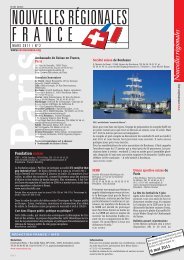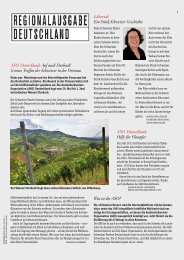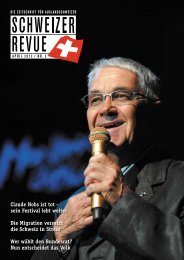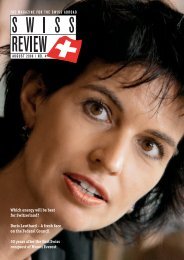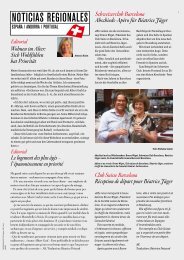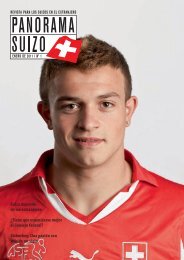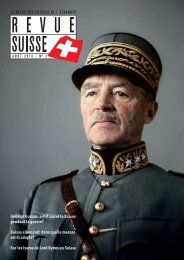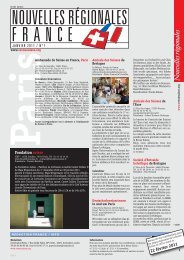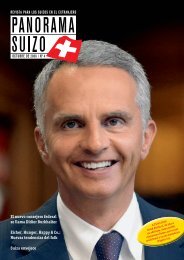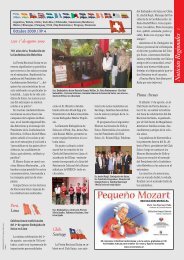Download PDF Swiss Review 1/2013 High Resolution
Download PDF Swiss Review 1/2013 High Resolution
Download PDF Swiss Review 1/2013 High Resolution
Create successful ePaper yourself
Turn your PDF publications into a flip-book with our unique Google optimized e-Paper software.
Sport<br />
23<br />
“I have great expectations in terms of speed!”<br />
The World Downhill Skiing Championships will take place in Schladming, Austria, between 4 and 17 February<br />
<strong>2013</strong>. Among the <strong>Swiss</strong> competing, Didier Défago has emerged as the new leader of the men’s team after Didier<br />
Cuche’s retirement and Beat Feuz’s prolonged recovery from injury.<br />
Interview by Alain Wey<br />
<strong>Swiss</strong> <strong>Review</strong> February <strong>2013</strong> / No. 1<br />
Photo: donated<br />
No matter what anyone says, <strong>Swiss</strong> downhill<br />
skiing has been leaderless since the start<br />
of the season. Didier Cuche was just as important<br />
in his role as team leader as in terms<br />
of results and consistency. Much is now expected<br />
of competitors like Didier Défago,<br />
Carlo Janka and Beat Feuz, heir apparent in<br />
the overall 2012 World Cup rankings. However,<br />
the latter is ruled out of action for the<br />
entire season following inflammation of his<br />
left knee after an operation last spring. As<br />
for Carlo Janka, he has yet to find the form<br />
that saw him top the overall World Cup<br />
rankings and become Olympic champion in<br />
2010. Injury problems have affected his confidence<br />
but things only need to click into<br />
place for the “iceman” to find his way back<br />
onto the podium. Due to these circumstances,<br />
the spotlight has now fallen on the<br />
senior member of the team, 35-year-old Didier<br />
Défago from Valais. The 2010 Olympic<br />
downhill champion has repeatedly<br />
proven his quality and is also familiar with<br />
the harsh reality of injuries. In September<br />
2010, just six months after the Vancouver<br />
Olympic Games, he seriously damaged the<br />
cruciate ligament in his left knee and required<br />
an operation. His recovery forced<br />
him to miss the 2011 season. He nevertheless<br />
returned to the highest level by picking<br />
up his fourth World Cup victory in the Bormio<br />
downhill on 29 December 2011. <strong>2013</strong> is<br />
of course the year of the World Championships,<br />
which will take place from 4 to 17<br />
February in Schladming, Austria.<br />
“<strong>Swiss</strong> <strong>Review</strong>”: Like a good wine, you<br />
are improving with age, especially with the<br />
two victories in the downhill at Wengen and<br />
Kitzbühl in 2009.<br />
Didier Défago: People say that I’m improving.<br />
Compared to last year when I was<br />
coming back from injury, my goal is now to<br />
enhance my performance. I have great expectations<br />
in terms of speed!<br />
You must be excited about taking part in the<br />
World Championships. You have been competing<br />
in this event since 2001<br />
and have yet to win a medal.<br />
This is definitely a big<br />
opportunity that has<br />
evaded me. Schladming is<br />
a slope that suits me well as<br />
it is quite long and physically<br />
demanding. It’s exactly<br />
the type of terrain<br />
that I love. Obviously,<br />
ever ything then depends<br />
on the weather conditions<br />
and the snow.<br />
How will you manage<br />
the big day?<br />
I’ll use my experience<br />
but it’s also a question of<br />
hitting form at the right<br />
time. Training and World<br />
Cup competitions have to<br />
be managed carefully to<br />
arrive with maximum energy.<br />
You simply have to<br />
keep yourself fresh for<br />
the World Championships.<br />
What’s life within the camp like<br />
without Didier Cuche? What is<br />
the new set-up like?<br />
It’s working really well. Everyone knows<br />
that there can be changes from one year to<br />
the next both in terms of trainers and<br />
competitors. New equipment has also<br />
been imposed on us even though our main<br />
ski brand suited us well. Had we kept it, it<br />
would have enabled us to get a better idea<br />
of our performance during training.<br />
“It’s hard to imagine<br />
doing anything else”<br />
What strengths does the team possess now?<br />
We are a small team capable of achieving<br />
good results. Everything is going well so far<br />
Didier Défago does not see himself as our only great hope<br />
but some team members are only just returning<br />
from injury, such as Marc Gisin and<br />
Patrick Küng. Our team has also shrunk. We<br />
are missing Beat Feuz. At least Carlo Janka<br />
is on his way back.<br />
Do you feel as though you have taken over<br />
the role of leader within the team?<br />
I don’t want to take anyone’s place. Everyone<br />
is different but it’s certainly true that<br />
people are looking to me as a leader and for<br />
the moment I’m going with it.<br />
You are now one of the few French-speaking<br />
<strong>Swiss</strong> on the men’s team.<br />
I am actually the only French-speaking<br />
<strong>Swiss</strong>. But I speak <strong>Swiss</strong> German fluently.<br />
It’s been like this for some time. There were



